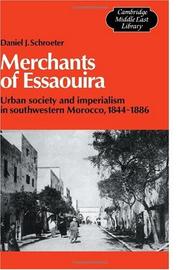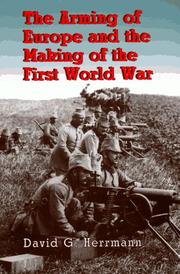| Listing 1 - 5 of 5 |
Sort by
|
Book
ISBN: 2909675211 9782909675213 Year: 1996 Publisher: Bourg-en-Bresse : Marines éd.,
Abstract | Keywords | Export | Availability | Bookmark
 Loading...
Loading...Choose an application
- Reference Manager
- EndNote
- RefWorks (Direct export to RefWorks)
Book
Year: 1967 Publisher: Tanger : Editions marocaines et internationales,
Abstract | Keywords | Export | Availability | Bookmark
 Loading...
Loading...Choose an application
- Reference Manager
- EndNote
- RefWorks (Direct export to RefWorks)

ISBN: 0511753101 0521324556 0521105404 Year: 1988 Publisher: Cambridge : Cambridge University Press,
Abstract | Keywords | Export | Availability | Bookmark
 Loading...
Loading...Choose an application
- Reference Manager
- EndNote
- RefWorks (Direct export to RefWorks)
Essaouira was founded n 1764 by Sultan Sidi Muhammad b. Abdullah as his port for developing trade with Europe. Through a group of Jewish middlemen, it served as a link between Europe, Morocco and su-Saharan Africa. In the eighteenth and nineteenth centuries its fame rivalled Tripoli, Tunis and Algiers. Based on extensive untapped archive in Morocco, papers of Jewish merchant houses and consular records of Britain, France and the United States, this book gives an account of the city in its heyday. Essaouira was an opening to foreign penetration, but it was also important to the Moroccan government, because potentially dissident regions became tied to its commercial and political activities. The control of the sultans was undermined as foreign powers imposed liberal trade and intervened in Moroccan affairs. This study of a specific city and region throws light on the problems of traditional societies in the age of European economic imperialism.
Capitalism --- Merchants --- Businesspeople --- Market economy --- Economics --- Profit --- Capital --- History --- Essaouira (Morocco) --- Mogador (Morocco) --- Ṣawīrah (Morocco) --- Essaouira, Morocco --- Soṿirah (Morocco) --- Economic conditions. --- Commerce --- Social Sciences --- Anthropology

ISBN: 0691033749 0691201382 9780691033747 9780691201382 Year: 2020 Publisher: Princeton, NJ
Abstract | Keywords | Export | Availability | Bookmark
 Loading...
Loading...Choose an application
- Reference Manager
- EndNote
- RefWorks (Direct export to RefWorks)
David Herrmann's work is the most complete study to date of how land-based military power influenced international affairs during the series of diplomatic crises that led up to the First World War. Instead of emphasizing the naval arms race, which has been extensively studied before, Herrmann draws on documentary research in military and state archives in Germany, France, Austria, England, and Italy to show the previously unexplored effects of changes in the strength of the European armies during this period. Herrmann's work provides not only a contribution to debates about the causes of the war but also an account of how the European armies adopted the new weaponry of the twentieth century in the decade before 1914, including quick-firing artillery, machine guns, motor transport, and aircraft. In a narrative account that runs from the beginning of a series of international crises in 1904 until the outbreak of the war, Herrmann points to changes in the balance of military power to explain why the war began in 1914, instead of at some other time. Russia was incapable of waging a European war in the aftermath of its defeat at the hands of Japan in 1904-5, but in 1912, when Russia appeared to be regaining its capacity to fight, an unprecedented land-armaments race began. Consequently, when the July crisis of 1914 developed, the atmosphere of military competition made war a far more likely outcome than it would have been a decade earlier.
World War, 1914-1918 --- Arms race --- Military readiness --- Première guerre mondiale --- Course aux armements --- Armements --- Causes. --- Causes --- Première guerre mondiale --- Europe --- Arms race - Europe. --- Military readiness - Europe. --- Military readiness. --- War --- Arms proliferation --- Proliferation of arms --- Security, International --- Arms control --- Arms transfers --- Disarmament --- Armaments --- Defense readiness --- Defenses, National --- Military preparedness --- National defenses --- Preparedness (Military science) --- Readiness (Military science) --- Military policy --- Manpower --- Causes of war --- Council of Europe countries --- Eastern Hemisphere --- Eurasia --- Aehrenthal, Alois Lexa von. --- Algeciras conference. --- Austro-Hungarian. --- Belgium. --- European war. --- Franco-Russian Alliance. --- Hafid. --- Haldane, Richard Burdon. --- Italian-Turkish War. --- Krupp steelworks. --- Mogador. --- Ottoman Empire. --- Schneider-Creusot industries. --- Triple Entente. --- Verdun. --- Zipfel. --- antimilitarism. --- cavalry. --- machine guns. --- predictions of. --- quick-firing artillery. --- rifles. --- taxation. --- war plans.
Book
ISBN: 1442697199 1442697776 9781442697775 9781442697195 9780802096913 0802096913 Year: 2009 Publisher: Toronto
Abstract | Keywords | Export | Availability | Bookmark
 Loading...
Loading...Choose an application
- Reference Manager
- EndNote
- RefWorks (Direct export to RefWorks)
Writing with a Vengeance examines the life and works of a nineteenth-century French courtesan, Celeste Venard, later the Countess de Chabrillan.
Authors, French --- Courtesans --- French literature --- Courts and courtiers --- Prostitutes --- History and criticism. --- Chabrillan, Céleste Vénard de, --- Chabrillan, Elisabeth-Céleste Vénard, --- Mogador, Céleste, --- Vénard, Céleste, --- Criticism and interpretation. --- Women authors, French --- French women authors --- France. --- Bro-C'hall --- Fa-kuo --- Fa-lan-hsi --- Faguo --- Falanxi --- Falanxi Gongheguo --- Farans --- Farānsah --- França --- Francia (Republic) --- Francija --- Francja --- Francland --- Francuska --- Franis --- Franḳraykh --- Frankreich --- Frankrig --- Frankrijk --- Frankrike --- Frankryk --- Fransa --- Fransa Respublikası --- Franse --- Franse Republiek --- Frant͡ --- Frant͡s Uls --- Frant͡sii͡ --- Frantsuzskai͡a Rėspublika --- Frantsyi͡ --- Franza --- French Republic --- Frencisc Cynewīse --- Frenska republika --- Furansu --- Furansu Kyōwakoku --- Gallia --- Gallia (Republic) --- Gallikē Dēmokratia --- Hyãsia --- Parancis --- Peurancih --- Phransiya --- Pransiya --- Pransya --- Prantsusmaa --- Pʻŭrangs --- Ranska --- República Francesa --- Republica Franzesa --- Republika Francuska --- Republiḳah ha-Tsarfatit --- Republikang Pranses --- République française --- Tsarfat --- Tsorfat
| Listing 1 - 5 of 5 |
Sort by
|

 Search
Search Feedback
Feedback About UniCat
About UniCat  Help
Help News
News